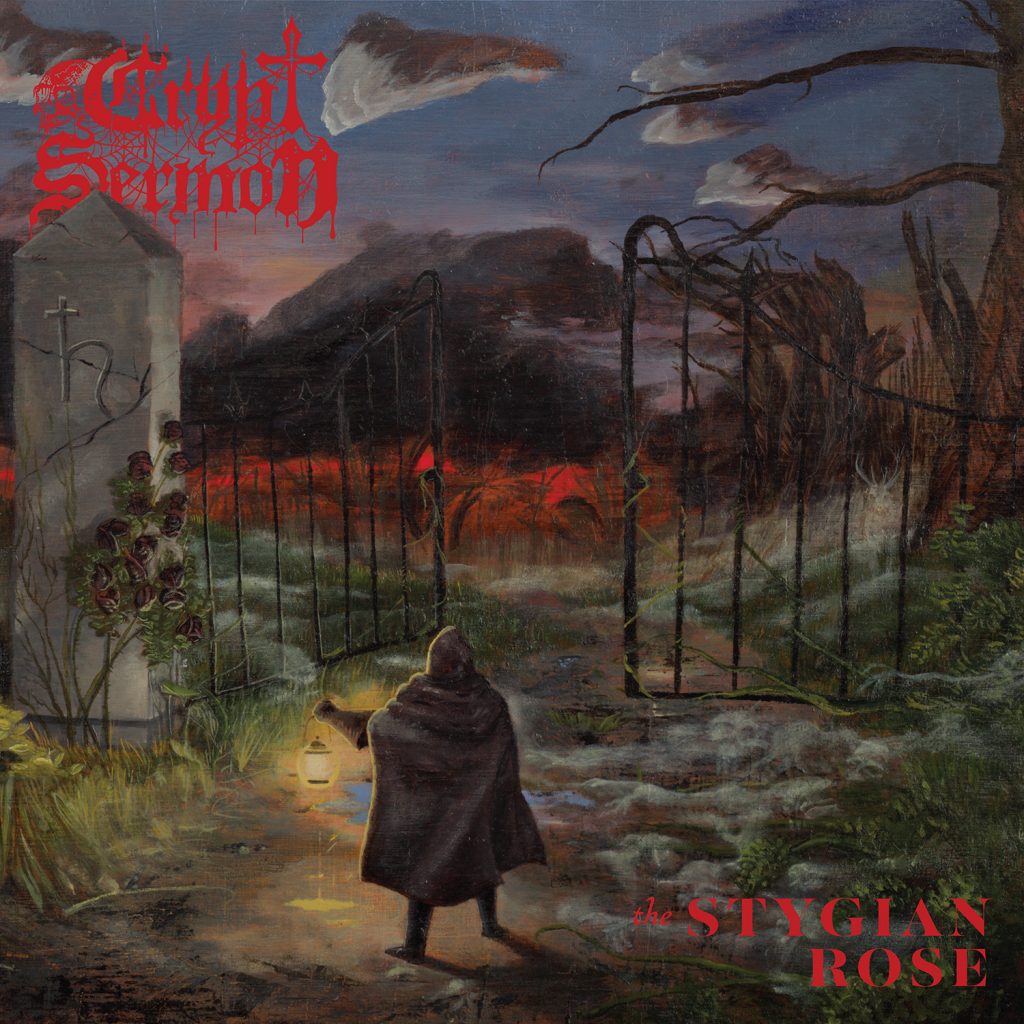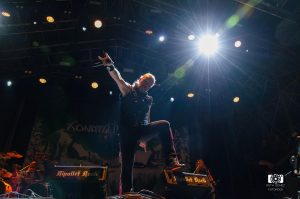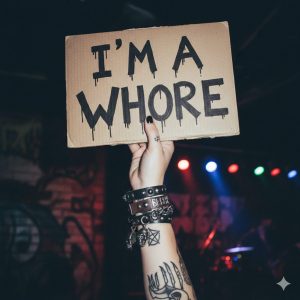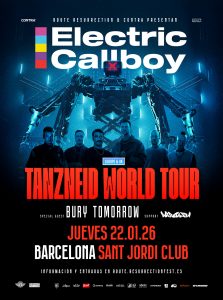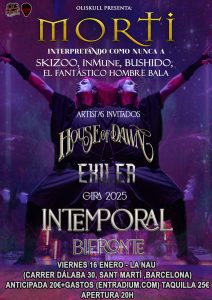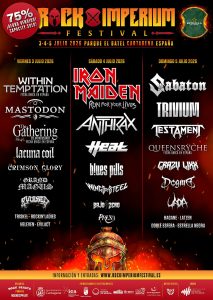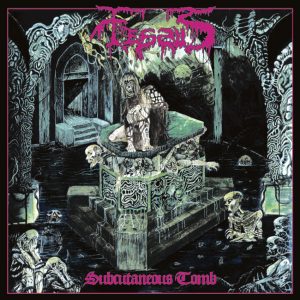CRYPT SERMON: Sermons of Steel: Crypt Sermon on Art, Atmosphere, and Their Epic New Album

In a genre steeped in heavy riffs and darker themes, Crypt Sermon has risen to become one of doom metal’s most captivating voices. With their latest release, The Stygian Rose, the Philadelphia-based band pushes their sound further into epic realms, blending introspective lyricism with crushing atmospheres. We sat down with vocalist Brooks Wilson to delve into the creative process behind their new album, their approach to songwriting, and the band’s ever-evolving musical journey. Expect insights into their artistic vision, influences, and what lies ahead for Crypt Sermon.
First of all, thank you very much for answering this interview!
1. To begin with, I’m curious about your band’s name. Does it have a personal meaning or is it a reference to something? What idea did you have in mind when forming the band?
Brooks: There’s not too much of a story behind it, we wanted to pick a band name that was consistent with other classic heavy metal band names like Black Sabbath, and Candlemass.
2. Besides -I ’m assuming – Candlemass or Solitude Aeturnus, which artists do you consider have influenced the band’s sound the most? Do you think that Epic Doom Metal is living a second youth, with excellent bands like Doomocracy, Atlantean Kodex, Lord Vigo or Ecclesia?
Brooks: I think those two are some obvious reference points, and I believe the Mercyful Fate influence should be pretty clear. Still, we’re not in any way restricted to being influenced by just epic doom metal bands, we are all in bands that span a great amount of creative output both within the metal genre and outside of rock music altogether. I’m not familiar enough with the newer bands to say weather or not Epic Doom is having a renaissance.
3. Brooks’ vocal abilities have improved a lot since your Demo MMXIII and now they sound perfect for your music proposal. I would like to know when you started to sing and whether you have taken singing lessons.
Brooks: Well, I’ve been singing to some degree for my whole life. I grew up on country, bluegrass, blues and gospel music. In addition to that I’ve been the vocalist for a few hardcore punk and other types of extreme metal bands. I didn’t start taking rock music singing very seriously until we did the demo. I’ve always been interested in it, just never gave it a shot. I haven’t had any formal lessons, but I work on my singing a lot and my goal is to continually improve.
4. I’m interested in your writing process. Are you inspired by any author’s work in particular? Do you consider The Ruins Of Fading Light a concept album about religious contradictions and the loss of faith?
Brooks: For lyrics writing, i’m more inspired by my outside interests which include the history of Christianity, Occultism, and Magick. The lyrics themselves, however, are often personal experiences encoded in the language of the mysteries. While the lyrics are inherently personal, I write with the intention of allowing the listener to make their own connections. This is a bit different from the approach taken on The Stygian Rose. While The Ruins of Fading Light has some thematic consistency, it is not about any one central theme, but many experiences clothed in the aesthetic of the late middle ages.
5. I must congratulate you on the atmosphere you are able to create with your music. How do you think The Stygian Rose differs from The Ruins Of Fading Light? It feels less introspective but darker.
Brooks: While this album allowed me to write outside my own perspective, I found it to be a much more introspective approach to lyric writing. In addition to the narrative elements not found on previous albums, I was able to connect with some emotions that I might only experience through fiction. This allowed me to delve into darker themes of longing and loss, themes that aren’t necessarily pervasive in my personal life.
6. If I’m not mistaken, Brooks is responsible for the cover art of your albums. Have you studied an arts degree? I think the artworks of your albums are outstanding and representative of your music.
Brooks: Yes, I’ve done all the art so far. I do have some background in formal training for painting, but it has also been a lifelong pursuit.
7. With the exception of the title track, The Stygian Rose is shorter than your previous album, and there are no instrumental tracks. Was to make a shorter record something you had in mind?
Brooks: We very much wanted to make an album that cut right to the chase. We wanted an album that the average listener would want to enjoy in one sitting, no fluff.
8. Your band members are also in other music projects, with three of your musicians playing as well in the black/thrash band Daeva. How did you manage to cope with your personal and professional life? Did you expect to receive this success?
Brooks: It’s not necessarily easy to juggle the work/life/play balance, but this is our passion, for all of us in Crypt Sermon. While we greatly appreciate the positive feedback, we still very much feel like we are just fans of heavy metal music who are so humbled to be making heavy metal music that others like. We’ve put all our lives into it, but we could not have expected such a great response.
9. How is it working with Arthur Rizk at the production? Was it more difficult to produce this album than its predecessor? I assume his amazing work as a guitar player at Eternal Champion and Sumerlands helps him to understand what you seek for in a record.
Brooks: Arthur is part of the Crypt Sermon family, and he’s been with us since our first album. This album was undoubtedly much easier to produce, compared to our previous works. First, Arthur has grown so much as a producer. Second, with this new album we were more familiar with the recording process, and Tanner (keyboards) brings a more technical understanding of production, so we had already carved out some clear expectations before we ever pressed the record button.
10. Enrique comes from Bolivia, which is another Spanish speaking country. I would like to ask him which South American releases he considers that deserve more recognition?
Brooks: While Enrique is from Bolivia, he was not able to participate in this interview.
11. Your guitar solos are clearly one of the key elements of the band. How would you describe your style? Which guitar effects pedals do you feel more comfortable with?
Brooks: Steve has been playing guitar for most of his life now, he is dedicated to the craft. While he was initially inspired by players like Jason Becker, Jeff Loomis, Marty Friedman, and Paul Gilbert, I think it’s quite obvious to hear that he incorporates some modern approaches to playing, as well as a keen ear for both style and feel.
12. You’ve been confirmed for the Up the Hammers festival, which will take place next year. Have you ever played in Europe before? What can we expect about your performance?
Brooks: We’ve been to Europe once before to play Hellfest in 2017, it was a great experience. For those who are new to seeing crypt sermon, expect a high energy performance with a lot of fan favorite songs.
Once again, thank you very much for your time! It’s been a pleasure to get to know you better. I wish you the best of luck in your next concerts!

